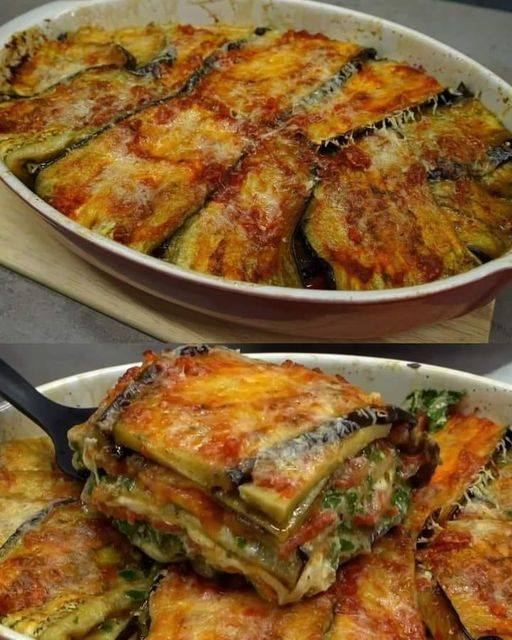Eggplants, also known as aubergines, are a versatile ingredient that holds a special place in many culinary traditions. Their rich, meaty texture and ability to absorb flavors make them perfect for layering in a myriad of dishes. If you’re looking for a recipe that showcases the unique qualities of eggplant while also delivering comfort and heartiness, consider crafting a delicious layered eggplant dish featuring a savory tomato sauce.
This article guides you in creating a compelling layered eggplant dish characterized by tender eggplant slices, a fragrant tomato sauce, and a symphony of flavors that will elevate your dining experience.
The Star Ingredient: Eggplant
Eggplant belongs to the nightshade family, which includes tomatoes and potatoes. Native to India, eggplant is now enjoyed worldwide. Its deep purple skin, firm flesh, and spongy texture lend itself beautifully to numerous recipes. The eggplant provides both a nutritional and culinary challenge.
Before diving into the preparation, it’s crucial to understand the role of salt in dealing with eggplants. Traditionally, cooks would salt eggplant slices to draw out excess moisture and bitterness. This technique also enhances the eggplant’s flavor. However, many modern varieties are bred to be less bitter, so while salting may not be strictly necessary, it’s a good practice when using larger eggplants.
Ingredient Overview
For the Eggplant Layers
- Eggplants (3 large): Choose firm, glossy eggplants without blemishes. Thinly slice them lengthwise for even layering.
- Olive Oil (2 tablespoons): This ingredient will not only facilitate cooking but also infuse the dish with flavor.
- Salt and Pepper: Essential seasonings that help to enhance the flavors of the dish.
For the Tomato Sauce
- Olive Oil (2 tablespoons): Used to sauté the onions and garlic, creating a fragrant base for your sauce.
- Onion (1 large, finely chopped): Adds depth and sweetness to the sauce.
- Garlic (4 cloves, minced): The aromatic quality of garlic complements the acidity of the tomatoes beautifully.
- Crushed Tomatoes (2 cans, 400g each): The primary base for your sauce, canned crushed tomatoes ensure a rich, consistent flavor.
- Tomato Paste (1 tablespoon): Intensifies the tomato flavor and adds a touch of sweetness.
- Dried Oregano (1 teaspoon): A classic herb in Italian cuisine that will add a warm, earthy flavor to your sauce.
- Dried Basil (1 teaspoon): Another staple herb that brightens up the dish with its aromatic quality.
- Red Pepper Flakes (1/2 teaspoon, optional): For those who enjoy a bit of heat, the flakes will add a gentle kick.
- Salt and Pepper: To taste, balancing the flavors of the sauce.
Preparation Steps
Step 1: Preparing the Eggplant
Start by preheating your oven to 400°F (200°C). While it warms up, prepare your eggplant. Thinly slice the eggplants lengthwise, aiming for around 1/4 inch thickness. Place the slices on a clean kitchen towel, sprinkle salt generously on one side, and allow them to sit for at least 30 minutes. This salting process allows moisture to be drawn out, explaining the resulting firmer texture that absorbs sauces better.
After 30 minutes, you should see beads of moisture forming on the eggplant slices. Wipe off the salt and excess moisture with a paper towel. Drizzle the eggplant slices with 2 tablespoons of olive oil and toss them to ensure they are evenly coated.
Place the eggplant slices on a baking sheet lined with parchment paper and roast them in the preheated oven for about 25-30 minutes until they are tender and slightly caramelized. Turning the slices halfway through roasting will promote even cooking.
Step 2: Whipping Up the Tomato Sauce
While the eggplant is roasting, it’s time to prepare your tomato sauce. In a large saucepan, heat the remaining 2 tablespoons of olive oil over medium heat. Add the finely chopped onion, stirring occasionally, and cook for about 5-7 minutes until it’s softened and translucent.
Next, add the minced garlic, cooking for another 1-2 minutes until fragrant. Be careful not to burn the garlic, as it can turn bitter quickly.
Now it’s time for the canned crushed tomatoes and the tomato paste. Stir them into the onion and garlic mix, allowing them to combine thoroughly. Add in the dried oregano, dried basil, and if you’re using it, the red pepper flakes. Season generously with salt and pepper to taste.
Bring the sauce to a gentle simmer and reduce the heat to maintain a low simmer for about 20-25 minutes. This allows the flavors to meld beautifully, thickening the sauce as it cooks without any added thickeners. Taste and adjust the seasoning as necessary.
Step 3: Layering the Dish
After the eggplant slices have roasted and the tomato sauce has simmered to perfection, it’s time to assemble your dish. Start by spreading a thin layer of tomato sauce at the bottom of an oven-safe baking dish. This prevents the eggplant from sticking to the dish and provides a flavorful base.
Next, lay a portion of the roasted eggplant slices on top of the sauce, ensuring they are evenly spread. Spoon more tomato sauce over the eggplant, repeating this process until all the eggplant and sauce are layered. You should aim for about three layers if time permits.
Step 4: Baking the Eggplant Layers
Once you’ve completed the layering, cover the baking dish with aluminum foil. Bake in the preheated oven for about 30 minutes. This step warms the dish throughout and allows the layers to meld together.
After 30 minutes, remove the foil and bake for an additional 10-15 minutes until the top layer appears slightly browned and bubbly.
Step 5: Serving and Enjoying
Once baking is complete, allow the dish to cool for about 10 minutes before serving. This brief cooling time helps it to set slightly, making it easier to slice and serve.
Dish the layered eggplant onto individual plates, garnishing with fresh basil or parsley if desired. Pairing this dish with crusty bread, a fresh salad, or even a side of pasta can make for a hearty, satisfying meal.
Nutritional Benefits
Aside from the sheer deliciousness of this dish, it also offers significant nutritional benefits. Eggplants are low in calories, high in fiber, and rich in antioxidants, making them a great choice for anyone looking to maintain a healthy diet. The tomatoes bring their own set of vitamins, particularly Vitamin C and potassium, while olive oil adds healthy fats to keep you satiated.
The combination of wholesome ingredients such as onions, garlic, and herbs not only enhances the flavor of the dish but also contributes to its health benefits. Garlic is known for its immune-boosting properties, while herbs like oregano and basil are packed with vitamins.
Conclusion
Creating a layered eggplant dish is not only a culinary challenge but a gratifying experience that draws on both technique and flavor. By using simple yet high-quality ingredients, you can make a dish that rivals any restaurant selection.
The balance of roasted eggplant, fragrant tomato sauce, and herbs creates a wonderful depth of flavor that’s sure to impress friends and family alike. Whether served as an elegant main course or a hearty side dish, this eggplant layers recipe is destined to become a beloved addition to your kitchen repertoire. So, roll up your sleeves, and let’s get cooking—deliciousness awaits!




